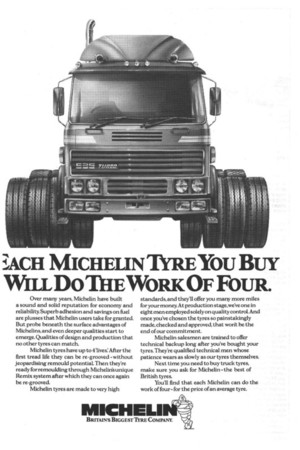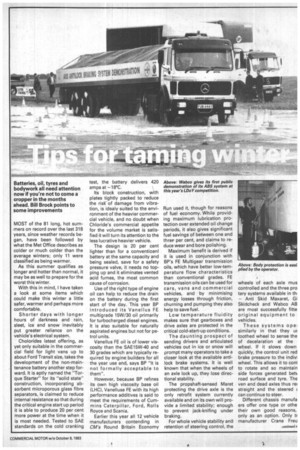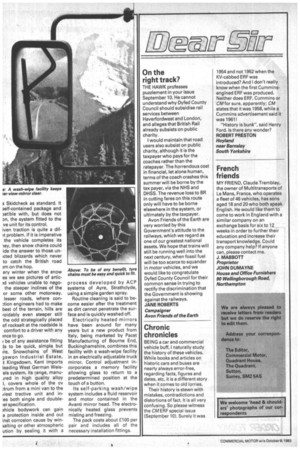ilACH MICHELIN TYRE You Buy WILL Do WORK OF FOUR
Page 66

Page 67

Page 68

If you've noticed an error in this article please click here to report it so we can fix it.
Over many years, Michelin have built a sound and solid reputation for economy and reliability Superb adhesion and savings on fuel are plusses that Michelin users take for granted. But probe beneath the surface advantages of Michelins, and even deeper qualities start to emerge. Qualities of design and production that no other tyres can match.
Michelin tyres have up to 4 lives: After the first tread life they can be re-grooved -without jeopardising remould potential. Then they're ready for remoulding through Michelin's unique Remix system after which they can once again be re-grooved. standards, and they'll offer you many more miles for your money. At production stage,we've one in eight men employed solely on quality controL And once you've chosen the tyres so painstakingly made, checked and approved, that worit be the end of our commitment.
Michelin salesmen are trained to offer technical backup long after you've bought your tyres. They're qualified technical men whose patience wears as slowly as our tyres themselves.
Next time you need to buy truck tyres, make sure you ask for Michelin the best of British tyres.
You'll find that each Michelin can do the work of four-for the price of an average tyre.
MOST of the 81 long, hot sum.mers on record over the last 318 years, since weather records began, have been followed by what the Met Office describes as colder or much colder than the average winters; only 11 were classified as being warmer.
As this summer qualifies as longer and hotter than normal, it may be as well to prepare for the worst this winter.
With this in mind, I have taken a look at some items which could make this winter a little safer, warmer and perhaps more comfortable.
Shorter days with longer hours of darkness and rain, sleet, ice and snow inevitably put greater reliance on the vehicle's electrical system.
Cholorides latest offering, as yet only suitable in the commercial field for light vans up to about Ford Transit size, takes the development of the non-maintenance battery another step forward. It is aptly named the "Torque Starter" for its "solid state" construction, incorporating absorbent microporous glass fibre separators, is claimed to reduce internal resistance so that during the critical engine start up period it is able to produce 20 per cent more power at the time when it is most needed. Tested to SAE standards on the cold cranking test, the battery delivers 420 amps at —18°C.
Its block construction, with plates tightly packed to reduce the riskof damage from vibration, is idealy suited to the environment of the heavier commercial vehicle, and no doubt when Chloride's commercial appetite for the volume market is satisfied it will turn its attention to the less lucrative heavier vehicle.
The design is 20 per cent lighter than for a conventioanl battery at the same capacity and being sealed, save for a safety pressure valve, it needs no topping up and it eliminates vented acid fumes, the most common cause of corrosion.
Use of the right type of engine oil can help to reduce the drain on the battery during the first start of the day. This year BP introduced its Vanellus FE multigrade 15W/30 oil primarily for turbocharged diesel engines. It is also suitable for naturally aspirated engines but not for petrol units.
Vanellus FE oil is of lower viscosity than the SAE15W-40 and 30 grades which are typically required by engine builders for all the year use and, says BP "It is not formally acceptable to them".
However, because BP refines its own high viscosity base oil (LHC), Vanelluse FE with its high performance additives is said to meet the requirements of Cummins Caterpillar, Ford, Rolls Royce and Scania.
Earlier this year all 12 vehicle manufacturers contending in CM's Round Britain Economy Run used it, though for reasons of fuel economy. While providing maximum lubrication protection over extended oil change periods, it also gives significant fuel savings of between one and three per cent, and claims to reduce wear and bore polishing.
Maximum benefit is derived if it is used in conjunction with BP's FE Multigear transmission oils, which have better low-temperature flow characteristics than conventional grades. FE transmission oils can be used for cars, vans and commercial vehicles, and by minimising energy losses through friction, churning and pumping they also help to save fuel.
Low temperature fluidity makes sure that gearboxes and drive axles are protected in the critical cold-start-up conditions.
The daunting prospect of sending drivers and articulated vehicles out in ice or snow will prompt many operators to take a closer look at the available antilock brake systems. It is well known that when the wheels of an axle lock up, they lose directional stability.
The propshaft-sensed Maret protecting the drive axle is the only retrofit system currently available and on its own will provide a limited stability; enough to prevent jack-knifing under braking.
For whole vehicle stability and retention of steering control, the
wheels of each axle mus controlled and the three pro tary systems available in th, — Anti Skid Maxaret, Gi Skidcheck and Wabco AB are most successfully fitte original equipment to vehicles.
These systems opel similarly in that they u: toothed wheel to sense the of deceleration at the wheel. If it slows down quickly, the control unit red brake pressure to the indivi wheel. This allows it to con1 to rotate and so maintain side forces generated bet road surface and tyre. The yen and dead axles thus rei straight and the steered can continue to steer.
Different chassis manufa ers offer one type or othe their own good reasons, only as an option. Only tr manufacturer Crane Freu
s Skidcheck as standard. It elf-contained package and iatIble with, but does not Dn, the system fitted to the ye unit for its control.
iven traction is quite a difIt problem. If it is imperative the vehicle completes its ley, then snow chains could ide the answer to those unIcted blizzards which never to catch the British road am on the hop.
ery winter when the snow es we see pictures of artic)d vehicles unable to negothe steeper inclines of the or some other motorway. lesser roads, where con:lion engineers had to make best of the terrain, hills are foidably even steeper still the odd strategically placed of rocksalt at the roadside is comfort to a driver with any Ince to go.
I be of any assistance fitting is to be quick, simple but ire. Snowchains of West gswon Industrial Estate,
t Kingsdown, Kent imports leading West German Weisels system. Its range, menuired in high quality alloy I, covers whole of the cv .:trum from a mini van to the /lest tractive unit and ines both single and doubleel specification.
ahicle bodywork can gain a protection inside and out inst corrosion cause by win3alting or other atmospheric ution by sealing it with a process developed by ACP systems of Ayre, Strathclyde, using a simple garden spray.
Routine cleaning is said to become easier after the treatment as dirt cannot penetrate the surface and is quickly washed off.
Electrically heated mirrors have been around for many years but a new product from Italy, being marketed by Pacet Manufacturing of Bourne End, Buckinghamshire, combines this facility with a wash-wipe facility in an electrically adjustable truck mirror. Control adjustment incorporates a memory facility allowing glass to return to a predetermined position at the touch of a button.
Its self-parking wash/wipe system includes a fluid reservoir and motor contained in the Avanti mirror head. The electronically heated glass prevents misting and freezing.
The pack costs about £100 per pair and includes all of the necessary installation fittings.




































































































